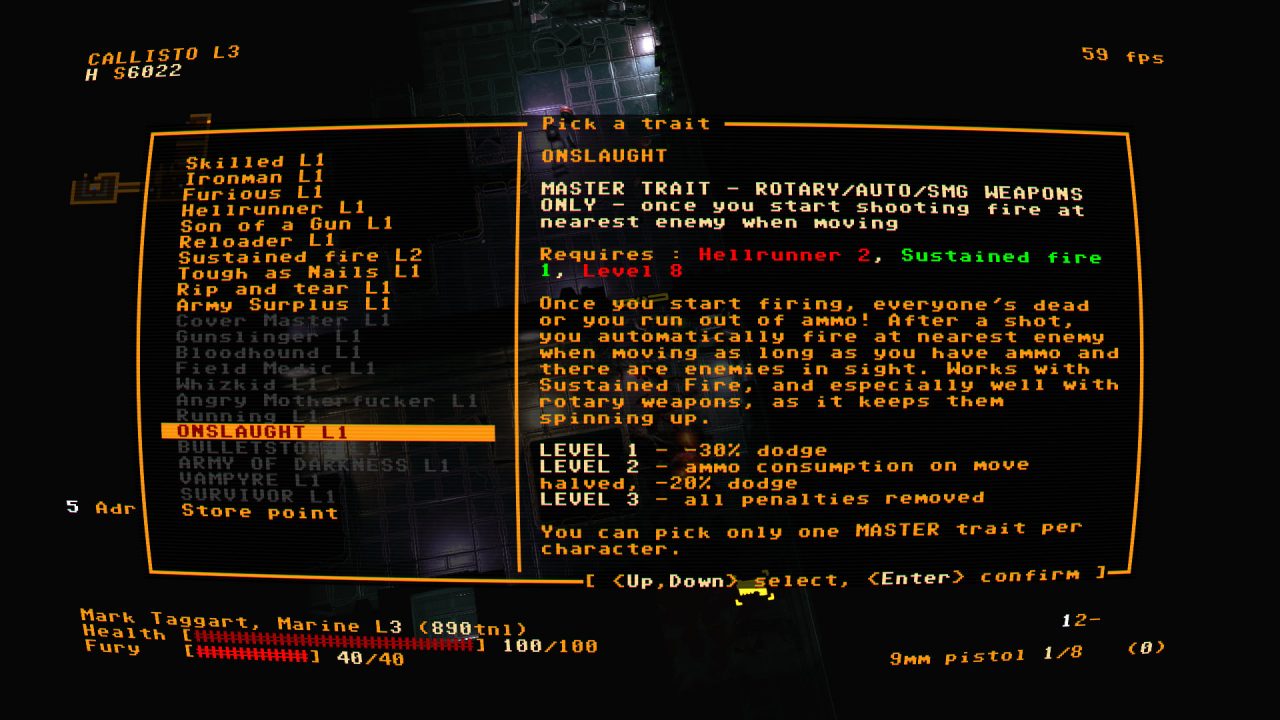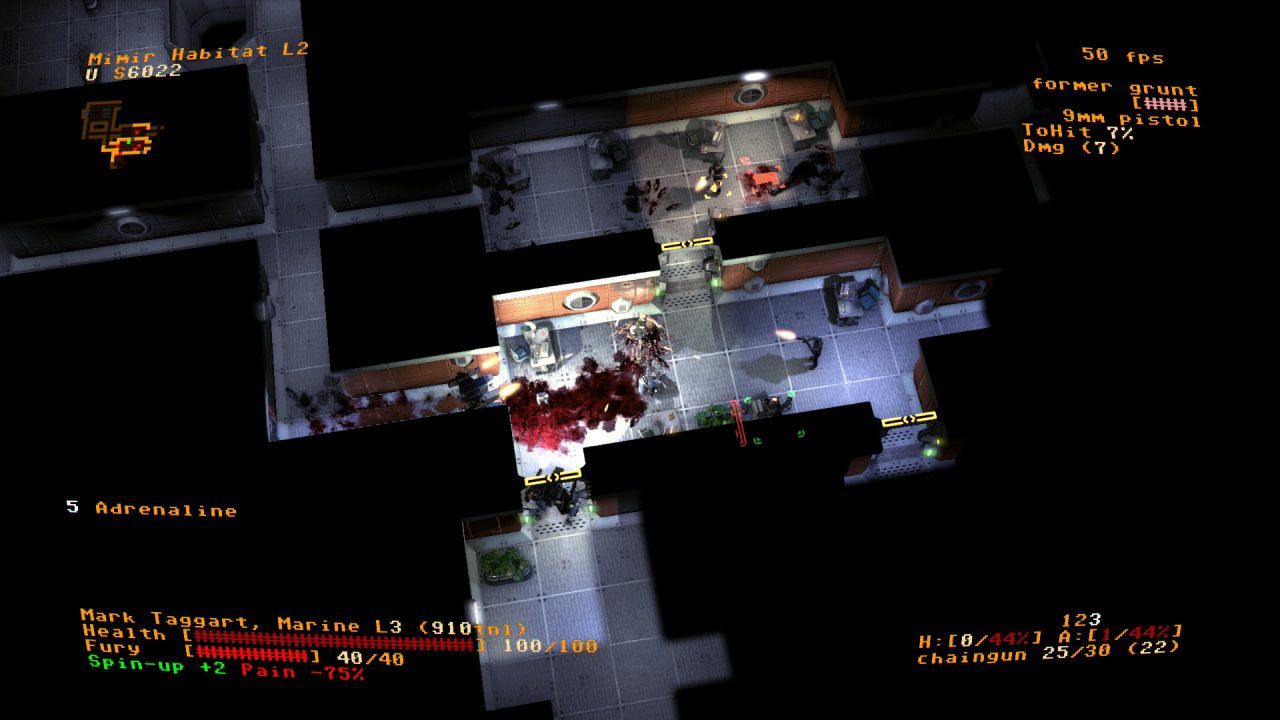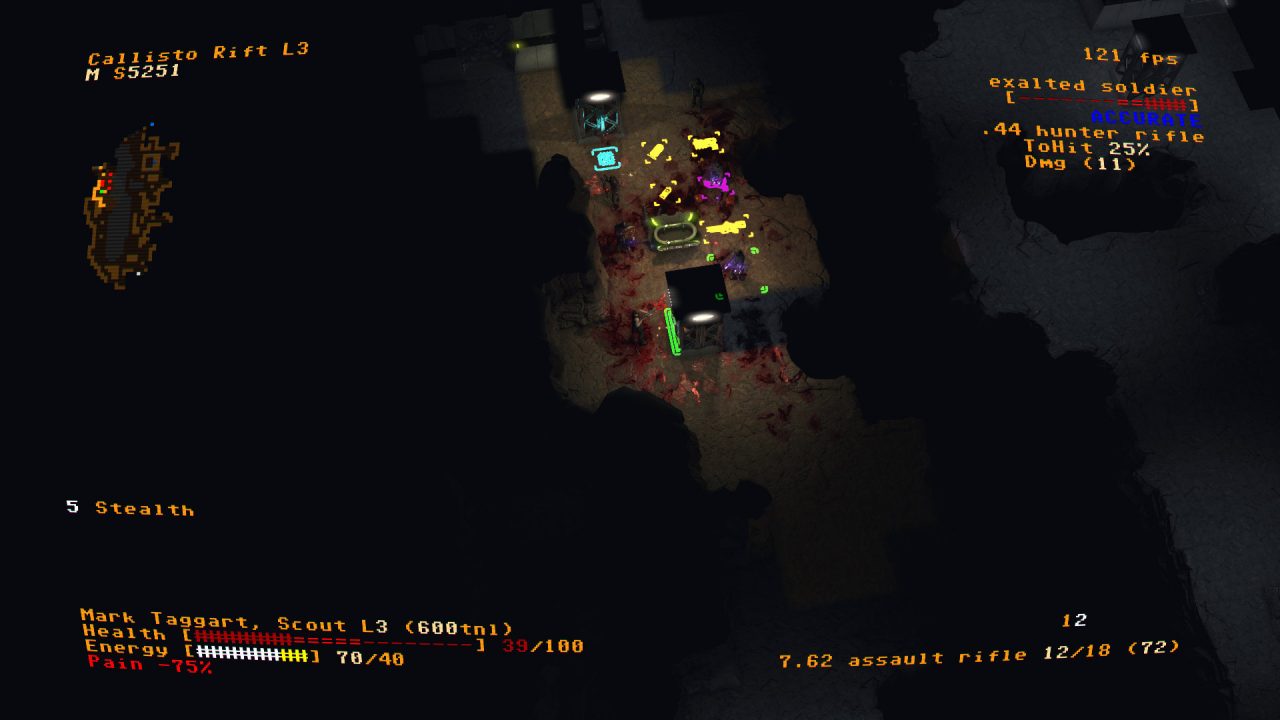Jupiter Hell is not a new game, and, no, I’m not speaking about the years of early access since its Kickstarter success. Kornel Kisielewicz’s baby got its start as DoomRL (Doom the Roguelike, now DRL due to legal concerns) in 2002. Since that time, Kisielewicz and his team made countless updates to this freeware for fans of traditional roguelikes and, of course, the first-person shooter: Doom. Whether you’ve taken a cursory look at Jupiter Hell waiting to see how the final product shakes out or you’re a long-time fan of Nethack, rest assured that the developers have shot the ever-loving <expletive deleted> out of my expectations.
Being a long-time fan of DoomRL, I wondered how it could be improved. I could certainly understand Kisielewicz wanting to take his project to the big leagues where he could get, ya know, paid. To me, DoomRL was nigh-gaming perfection. The strategic depth, heartbreaking (and stupid) deaths, faithful commitment to Doom’s world, and hundreds of hours I devoted to it were proof that it could stand taller than almost any commercial release over the last few decades.
Traditional roguelikes are a unique bird in that they’re often intimidatingly deep. Playing is simple, but if you want to be any good and have any chance of winning, you have to learn the systems. Modern roguelikes—roguelites—function more similarly to traditional RPGs in that with enough grinding, players can eventually win. Earning resources and leveling up ensure victory at some point. With a game like Jupiter Hell, the only thing that changes between runs is what you’ve learned from Yet Another Stupid Death (affectionately referred to as YASD in the roguelike community).

Jupiter Hell improves upon DoomRL’s systems in almost every way while remaining faithful to the bulk of its addicting game design. Players move along a grid in turn-based fashion with a couple weapons and a limited inventory. When an enemy shows up, they get distinctively highlighted and become targets for attacks. Players have several options, of course, including running away, using items (like grenades), or tucking their head between their legs to kiss their you-know-what goodbye.
That’s the gist of the game. It really is that simple to play. An onlooker might wonder—okay, where’s this so-called “depth?” Well, cover’s important if you want to live, so maybe depth is risking a step or two to lower the enemy’s chance of hitting you while you shoot from behind a wall. Or maybe you’ve chosen one of the several complex skills while leveling up to help you dodge out in the open while firing automatically. Better still, maybe you prepared for the fight in advance by not putting yourself in such a precarious position in the first place. An even bigger galaxy brain move might be using the sense you’ve earned over hundreds of hours to launch a rocket across the map where you predict explosive barrels might be and hit a whole bunch of enemies that you intuitively understand might be milling about in a lobby area. The choice is entirely yours.
Inventory management is probably an essential component of success in Jupiter Hell. By its limited nature, players have to constantly make challenging decisions about what to keep, what to pass up, and what to use in a moment where it might not be perfectly optimal to use. Even a seasoned player might have trouble if the game isn’t cooperating. A modded, legendary weapon might have to be tossed aside for a benign, vanilla plasma pistol if the ammo just won’t drop. Or, you know, you could die with that amazing weapon and have to start over. Every decision is about getting to the end of the game, and that sometimes means having to learn a new strategy and adapt to adverse circumstances—it’s absolutely thrilling!

Adapting to new situations means you can’t always run the same build in terms of skill points. When players slay enough foes or meet objectives, they earn levels, which equates to a single skill point. Out of the gate, each of three classes (marine, scout, technician) have several base skills, secondary skills, and a few master skills to choose from. One might expect that racing toward that master skill is the way to go—and maybe that’s right some of the time—though depending on how the game’s going, a master skill might pigeonhole a player into a build that just isn’t right for this particular run or challenge. Sometimes earning more basic skills is what the situation calls for, and that’s a legitimate way to approach the game. It’s completely up to you.
Under the hood, Jupiter Hell has a lot of calculations dependent on enemy stats, weapon stats, armor stats, skill levels, and environmental conditions. Most of this information is readily available, but some of the systems take time to learn. Since each successful run will take a newcomer a few hours, this can feel daunting. Jupiter Hell is not for the faint of heart. If you want to have a snowball’s chance in this game, you have to commit time, and not everyone’s going to be about that.
This is likely the biggest drawback of Jupiter Hell and probably any serious roguelike: accessibility. Although several difficulties exist, including easy (and you should seriously play on easy to start), this is still a punishing title. That’s part of the joy, though—success is not handed over to help you feel good about winning the game. It must be earned. A victory is the greatest reward because it genuinely takes planning, a calm mind, and the ability to adjust everything at a moment’s notice.
A new player might get overconfident if they happen across a strategy that gels with their playstyle or find a strong weapon by chance only to realize that once they get near the endgame, an enemy (or likely enemies) can blow them away for one careless act. “What! What a stupid game. Horrible design. Who would play this? You can’t just go from being strong to dead in two moves! Ugh!” I understand those lamentations. I’ve been there countless times in other games. I repeat, other games. A calm mind is needed to learn from YASD. I had a run recently where I was hiding behind cover and getting destroyed by a mech.
I could have sworn I was dodging, but the cover didn’t help at all. I found this strange, and I got frustrated as I engaged in a gun battle popping all of my medkits. After winning this minor duel with a regular enemy, I quickly lost because I was out of resources and probably a little irritated. As I reflected on that moment, I came to realize that I did dodge those shots, but I was sitting in a narrow hallway and those shots blew up on the wall directly behind me. Dodging or not, the explosion behind me was shredding me. Completely my fault, but I wouldn’t have realized it if I didn’t stop to think about what went wrong. That won’t happen again.

One of the comforts of playing Jupiter Hell is knowing that Kisielewicz and his team are veteran designers who have worked on this game as DoomRL for almost two decades. What other game can boast that? Assurances exist simply because of these facts. The other assurance is that this game will likely be getting updates for years to come. Kisielewicz has the receipts, and that’s something few developers can brag about.
Unfortunately, roguelikes aren’t always known for their presentation. Most roguelikes require a lot of information in a small space, frequently affecting visuals in these cases. Jupiter Hell looks good for what it is, but today’s gamer might want something a little more flashy. In no way is this a style-over-substance game. It’s completely substance with little style. What style it does have is in its audio. Mark Meer of Mass Effect fame voices our lead protagonist, and depending on what players are comfortable with, his mouth can get pretty filthy. If that’s not your thing, options can clean up his act or give him a more serious tone, as opposed to 90s tough guy.
Seeing as Jupiter Hell takes after DoomRL, expect to engage in a lot of military nonsense, including computer logs and emails. That’s about as much story as players will get, but as I’ve mentioned in my roguelike reviews, story is not what these games are about. Every computer terminal contains a few emails that add some flavor, but don’t expect a gripping narrative. Some major is chewing out some private, and some poor soul is complaining about the noises and isolation of working on one of Jupiter’s moons. Almost anyone can piece together what’s going on without reading anything, but perhaps more insights will come with time.
This isn’t a keyboard and mouse affair, but rather strictly keyboard or controller. The biggest departure from DoomRL is the lack of diagonal movement, but this isn’t really a bad thing, as it allows for tighter arenas rather than sprawling open space. With surprisingly few hotkeys or basic controls to memorize for such a complex title, Jupiter Hell is simple to navigate.
I could go on and on about all of the other bells and whistles, like the importance of spending multitools wisely at upgrade terminals, the incredible procedural generation of the levels and enemies, the more than a dozen modes to play, all of the in-game achievements to earn, and the plentiful secrets, but those are best discovered when you buy this game. If you’ve got a strategic bone in your body, you have to buy this. Go, buy it now. It’s $25 at full price, which might as well be an act of charity considering the quantity and quality of what you’re getting.




